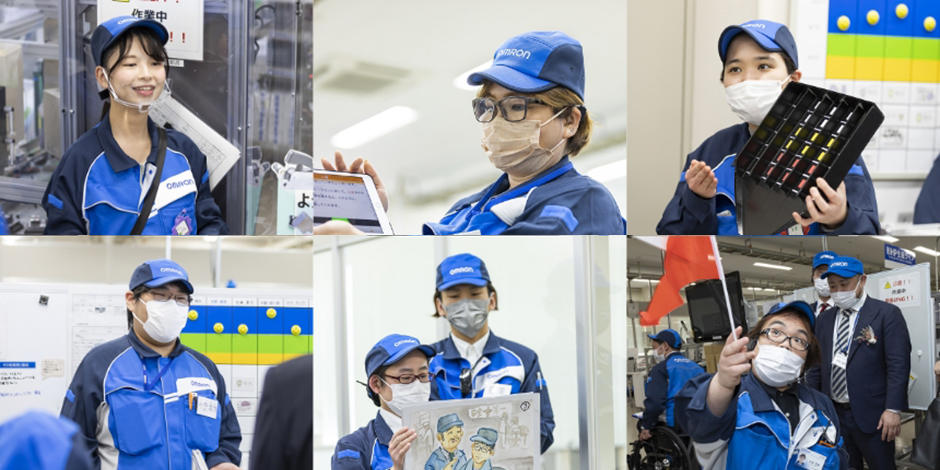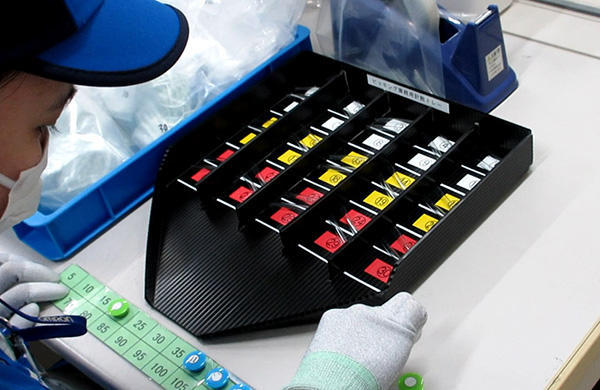We are Shaping the Future! Showcasing Success Stories as We Innovate for a Sustainable Tomorrow

Exploring ŌĆ£Work Styles of the FutureŌĆØ to Build a Sustainable Society
Inspired with the motto "No charity, but a chance!", OMRON, has been continuously working towards creating & strengthening a more diverse & inclusive workforce.
The organization operates two production centers, OMRON TAIYO and OMRON KYOTO TAIYO, in Japan where people with disabilities constitute the core workforce. OMRON TAIYO was founded in 1972 as Japan's first factory designed with a strong focus on welfare, and has been working to promote the employment of people with disabilities throughout the 50 years of its inception. What makes OMRON TAIYO so groundbreaking is that it approaches the employment of people with disabilities not as a charitable project, but rather with the aim of creating opportunities for such people to capitalize on their own capabilities to work and gain independence. This is because OMRON TAIYO's founders believed that providing places for people with disabilities to work would benefit society as a whole and make them a part of the mainstream.
OMRON TAIYO celebrated its 50th anniversary in April this year. The day of the anniversary celebrations featured a special program of events involving both employees and prominent experts, including a talk session that brought together leaders of diversity and inclusion initiatives in economic, sporting, cultural, and other fields to discuss their vision of work styles & daily life 50 years from now and a special factory tour in which factory workers explained and discussed their thoughts about work and personal joys and hardships they find in it. . In this article, we examine the past, present, and future of OMRON's employment initiatives toward the realization of manufacturing workplaces where people with disabilities can maximize their own attributes and capabilities and enjoy active working lives.
ŃĆĆ
OMRON TAIYO was founded as Japan's first welfare factory in the 1970s, a time when people with disabilities in Japan faced huge barriers to advancement in society. OMRON's founder Kazuma Tateishi, however, believed that a truly "better society would be one in which people with disabilities had the same opportunities to work as other people." This notion resonated with the work of Dr. Yutaka Nakamura, who was the founder of the social welfare corporation, Japan Sun Industries, and is also known as the father of para-sports in Japan, and thus OMRON TAIYO was born. Over the 50 years since then, the convictions that motivated OMRON's founder have remained alive and well throughout the OMRON Group.
OMRON TAIYO seeks to create workplaces and environments suitable for everyone, regardless of whether or not they have a disability, and where each individual worker can make full use of their own attributes and capabilities. Through a variety of improvements on the factory floor, including the automation of processes and the use of specially designed mechanical devices to make operations more efficient, OMRON TAIYO has strived continually to create "human-centered" working environments in which facilities are improved in order to maximize workers' potential, rather than requiring workers to adapt to the existing facilities. No less than 1,361 workplace-driven proposals for improvement were formulated in the ten years since 2011 alone, indicating that these proposals are on their daily basis. Moreover, in recent years the company has been working to generate employment not only for people with specially- abled but also those with intellectual disabilities and mental conditions such as developmental disabilities. By pursuing "universal manufacturing" (commonly referred to as "UNIMONO") accessible by anyone regardless of the nature of their disability, promoting communication and encouraging other workers to watch over colleagues with mental/developmental disabilities, and other such initiatives to design work activities for ease of use by each and every worker, OMRON TAIYO is constantly challenging itself to develop environments in which every worker can shine. OMRON TAIYO's original approach to creating workplaces that capitalize on individual potential has spread a circle of empathy and resonance across the world, with around 2,000 visitors from national and local government authorities, private companies, and other organizations both within Japan and overseas coming to OMRON TAIYO each year in search of guidance on how to generate employment opportunities for people with disabilities and help them to shine at work.
 A tool that enables the tallying of "how many components have been counted how many times" while performing a certain task
A tool that enables the tallying of "how many components have been counted how many times" while performing a certain taskŃĆĆ
On the occasion of its 50th anniversary this year, OMRON TAIYO held a series of commemorative events under the title UNLOCK THE FUTURE, involving a wide variety of people in dialogue regarding future work styles for the next 50 years.
The events included a special factory tour in which employees served as guides and engaged visitors in dialogue. This was an opportunity for team members unaccustomed to speaking in front of others to share their thoughts about work and the personal joys and hardships they find in it. This was the first time in OMRON TAIYO's 50-year history that employees themselves explained their own initiatives to visitors in their own words. The anniversary celebrations also featured a talk session that brought together leaders of diversity and inclusion in many spheres of society to discuss their vision of work styles and daily life 50 years from now. Under the theme of "work styles of the future," the guests engaged in passionate discussion of future approaches to work that will enable everyone to shine.
The art producer Yoshie Kurisu was engaged as the planning advisor for these special factory tour and talk session. Reflecting on how the project began, Kurisu explains: "OMRON TAIYO has a wealth of know-how that other companies throughout Japan are now keen to obtain. The desire to share this know-how with the whole of Japan was my personal starting point for this project. Of course, visitors can learn a lot from a standard factory tour, but I proposed that this time we focus more on the people actually working in the factory."
In the talk session, former captain of the Japanese national rugby team and Representative Director of HiRAKU Co., Ltd., Toshiaki Hirose talked about the first time he visited the OMRON TAIYO factory. "I was shown how a device designed for a worker only able to use one arm led to efficiency gains for workers who can use both arms too. I was deeply impressed to see a workplace so alive with innovation."
Meanwhile, curator and producer Mahoro Uchida offered some words of encouragement for the next generation: "I want you to take more pride in the leadership role you've played over the past 50 years in creating work for everyone and eliminating disabilities through the integration of people and machines. You all have so much know-how that I want you to share with wider society, for example by making your 3D data openly available so people needing mechanical devices can use your data to create them on 3D printers." Hiroki Sasahara, a Section Chief in OMRON TAIYO's Production Technology Group who took to the podium to speak on behalf of OMRON TAIYO itself, reflected on the anniversary project as follows: "Over the past few months, we've received advice from numerous people outside the company and gained ideas that we didn't have before. The people in our factory have always been shining through in their work, but now we've brought them into the spotlight. I hope we can become a model for how potential generated through diversity can be integrated with technology to create a society that doesn't even need the words to distinguish between people with disabilities and those without."
 (From left) Yoshie Kurisu, Toshiaki Hirose, Mahoro Uchida, Hiroki Sasahara
(From left) Yoshie Kurisu, Toshiaki Hirose, Mahoro Uchida, Hiroki SasaharaŃĆĆ
OMRON President and CEO Yoshihito Yamada describes the history that OMRON TAIYO has created in the following terms: "I believe that the driving force that has enabled OMRON TAIYO to overcome its numerous challenges surely lies in the passion and enthusiasm of its workers, including the pioneers of OMRON TAIYO who set out to benefit society through their own work. The last 50 years have been ones of trial and error, seeking answers to the questions of how people and machines can work together to expand human potential, and how we can capitalize on the strengths of each and every person. I'm convinced that what we have achieved today is a product of the continued efforts of all those working at OMRON TAIYO to engage in this process of trial and error and challenge themselves to create a flexible production system in which machines are responsive to human needs."
In April this year, the OMRON Group unveiled Shaping the Future 2030: a new long-term vision for contributing to sustainable social and economic systems through "Empowering People Thorough Automation." This is the first time that OMRON's long-term vision has included non-financial targets, one of which is to "realize employment of persons with disabilities at 28 overseas sites and maintain the ratio of employees with disabilities at 3% in Japan." OMRON is now working to accelerate its diversity and inclusion initiatives in order to achieve this target. One of the initiatives in this area is the project to recruit people with different skills, which involves proactively appointing people to deploy the extraordinary abilities they possess in a specific field, such as R&D and new product development. OMRON TAIYO's pioneering work has inspired many other companies to follow suit through the establishment of special subsidiary companies and the like. The OMRON Group will continue to play a leading role in the creation of a better society, sharing the know-how OMRON TAIYO has built over the past 50 years on the global stage, and pursuing new initiatives in diversity and inclusion.